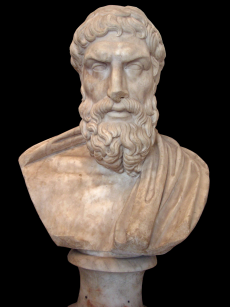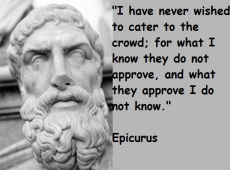
Email: ZYVC057@live.rhul.ac.uk
Total Article : 213
About Me:I'm a graduate student studying International Criminal Law and first started writing for King's News almost 4 years ago! My hobbies include reading, travelling and charity work. I cover many categories but my favourite articles to write are about mysteries of the ancient world, interesting places to visit, the Italian language and animals!

A renowned philosopher from Samos, who strives to avoid the ongoing dissatisfactions and frustrations of public life, redefines the discipline of politics, breaking it from its traditionally Greek roots and viewing the subject under an entirely new light. If you believe politics can cause distress, you may be more like this philosopher than you could have ever imagined. This is the story of Epicurus’ take on politics.
The Golden Age of Philosophy (500BC-300BC) identified politics with all thoughts regarding the ideal state. Great thinkers such as Plato envisioned a harmonious perfect state of governance within Ancient Greece but as the Greek city-states evolved the discipline of politics was then broadened, venturing in various aspects of the political sphere. Epicurus focuses on the care of oneself above all. He develops a theory on atomism which states that people cannot guarantee a single truth, so whilst his ancestors were primarily concerned with fixing government Epicurus shuns politics and leaves us with no concrete political theory. Epicurus sees the idealistic approach that previous philosophers adopted, in which they would argue for how the best state should be in a utopian world, as a great cause of unnecessary grief. In fact one thing Epicurus does teach us is the art of living.
The two mainstream schools of thought in Athens at the time were Plato’s Academy and Aristotle’s Lyceum which both welcome the most ambitious and talented students eager to learn politics. Epicurus’ disinvolvement in political life is reflected in his laidback school, known as The Garden. Unlike the exclusive admission of the two prominent schools, The Garden welcomes women and, according to an anecdote, even Epicurus’ slave! This was Epicurus’ own space to preach about the importance of being content and how political preoccupations pose turbulence in one’s life. Epicurus’ ultimate goal was to reach a state of ‘ataraxia’, avoidance of sufferance, and ‘aponia’, the absence of corporal pain and staying away from politics gave one the best chance of achieving this.

If you think about it the same methodology is applied by many still today; one way not to get caught up in the intricate web of party politics during election season is in fact to simply stay far away from politics and not get involved in the debate in any way. Some, like Epicurus, would even say that politics can cause grief and despair, especially when dealing with things that won’t come true; centuries ago it was the idea state that is often debated but never realised, today it is other topics of heated discussion. Whilst this is a very cynical lesson some take from Epicurus others see his teachings in a different light. He concentrates on the individual and on finding harmony within us first and foremost, bringing politics down from its pedestal of ambitious plans and centring it once again round its citizens.
By going beyond the standard theories on the structure of the state, Epicurus was able to explore the ethics of individuals, who pose themselves as the building blocks of society itself.
Image 1: http://ancientrome.ru/art/artwork/sculp/figure/epicurus/epi006.jpg
Image 2: http://www.rugusavay.com/wp-content/uploads/2013/09/Epicurus-Quotes-3.jpg

0 Comment:
Be the first one to comment on this article.